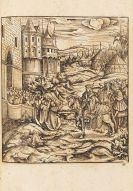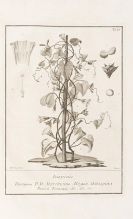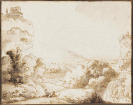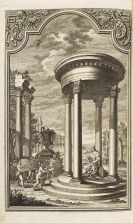
Friedrich Gottlieb Klopstock
Quedlinburg
1724 -
Hamburg
1803
The German poet Friedrich Gottlieb Klopstock was born on July 2, 1724 in Quedlinburg, the son of a lawyer. Klopstock received a pietistic upbringing. In Quedlinburg he attended the Gymnasium and later the classical Fürstenschule in Schulpforta.
Friedrich Gottlieb Klopstock studied theology in Jena, during which time he wrote his work "Messias", which he put down first in prose and later reworked into verse while in Leipzig "Messias" as a sensation.
Furthermore, his first odes appeared at this time. He successfully finished his studies and worked as a tutor in Langensalza. There Klopstock fell in love with Marie-Sophie and during this intense time wrote his most beautiful odes.
The publication of Klopstock's works created a storm of excitement among the opponents of Gottsched, whose "Poetry of Reason" had ruled the genre until then. With his odes, Friedrich Gottlieb Klopstock affected a turn in rational poetics. His works cleared the way for pure poetry.
In 1750, he went to Zurich on the invitation of Johann Jakob Bodmer. Nine months later, he traveled to Denmark to King Frederick V. Supported by the king, Klopstock worked in Denmark until 1753, finishing his work there. In 1754 he married Margarete Moller, who died four years later.
Friedrich Gottlieb Klopstock, having felt such a love for her, mourned and praised her in his elegies. In his later years, he married again, this time to Johanna Elisabeth von Winthem from Hamburg.
From 1756 to 1762 Klopstock lived in his hometown, Quedlinburg, and also Braunschweig and Halberstadt, finally settling in Copenhagen in 1771. He finished his "Messias" in 1773 and wrote several dramas. From Copenhagen, he went to Hamburg, and, on the invitation of Margrave Karl Friedrich of Baden, Klopstock went to Karlsruhe in 1776.
Friedrich Gottlieb Klopstock was an ingenious epicist, lyricist, and dramatist between the Baroque and Classical periods. He began the traditions of German Irrationalism and "Erlebnisdichtung" (poetry of experience).
He was an avid supporter of the French revolution, though he later distanced himself from the fanatical and tyrannical descendants of the revolution. He was also an important precursor of the "Storm and Stress" period.
Klopstock died on March 14, 1803 in Hamburg.
Would you like to sell a work by Friedrich Gottlieb Klopstock?
Infos for seller












